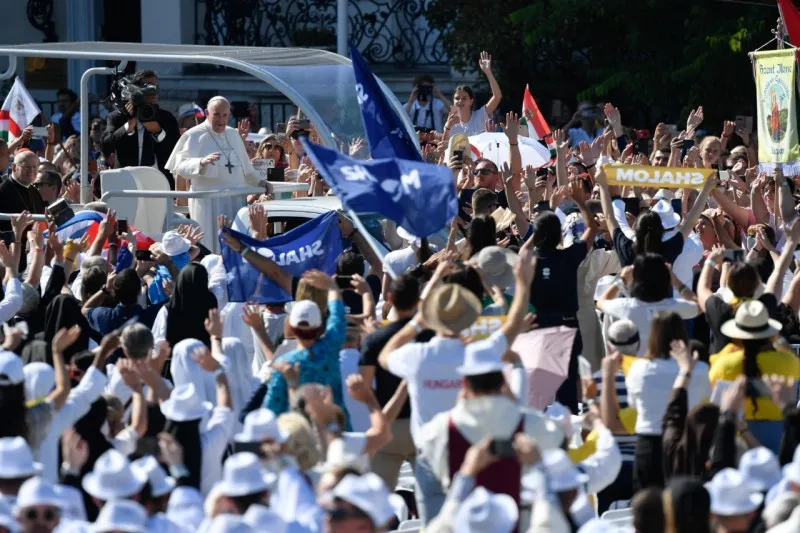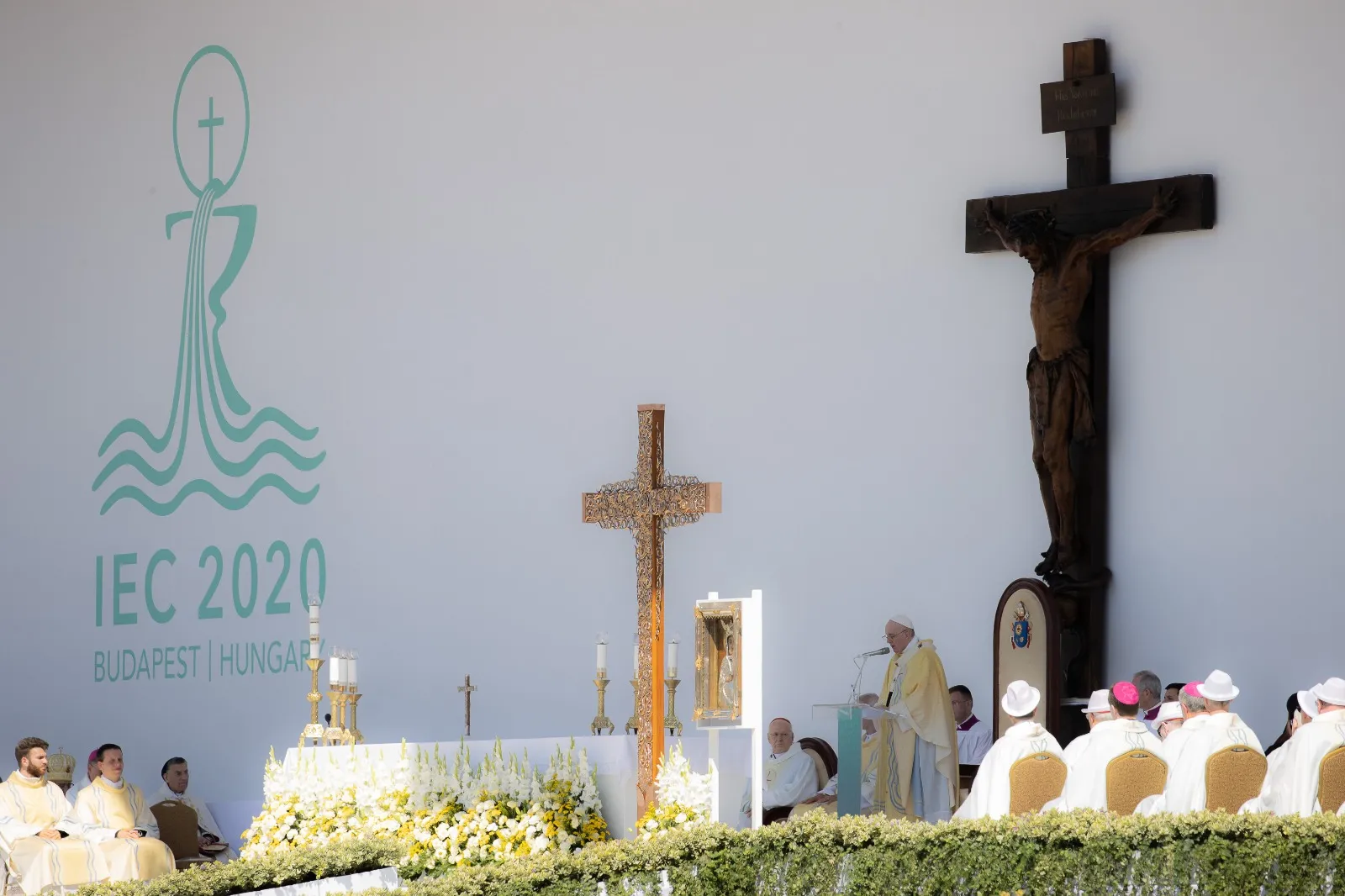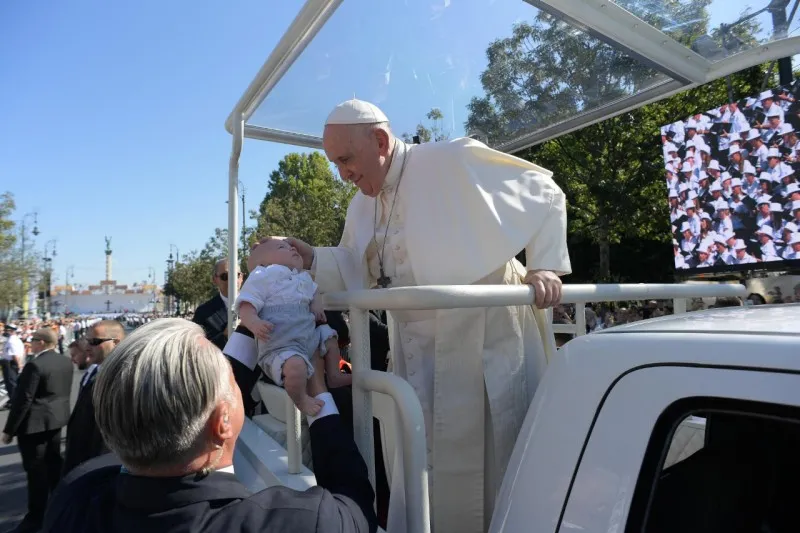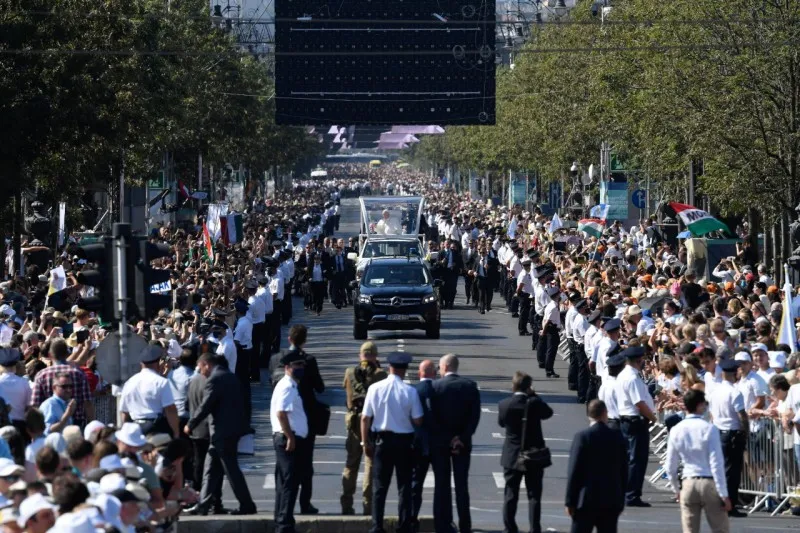
Rome Newsroom, Sep 12, 2021 / 05:30 am (CNA).
Pope Francis encouraged Catholics at the International Eucharistic Congress in Budapest to spend more time in adoration of the Blessed Sacrament to become more like Christ.
“Dear brothers and sisters, let us allow our encounter with Jesus in the Eucharist to transform us, just as it transformed the great and courageous saints you venerate,” Pope Francis said in his homily in Hungary on Sept. 12.
“We do well to spend time in adoration before the Eucharist in order to contemplate God’s weakness. Let’s make time for adoration,” the pope said.
Pope Francis is the first pope to attend an International Eucharistic Congress since the year 2000. He offered the closing Mass for a crowd of tens of thousands gathered in Heroes’ Square in Budapest.
.jpg)
“The Eucharist is here to remind us who God is. It does not do so just in words, but in a concrete way, showing us God as bread broken, as love crucified and bestowed,” the pope said.
“Today, as in the past, the cross is not fashionable or attractive,” he said. “Yet it heals us from within. Standing before the crucified Lord, we experience a fruitful interior struggle, a bitter conflict between ‘thinking as God does’ and ‘thinking as humans do.’”
The pope said that God’s way of humble love is different from “the wisdom of the world,” which is attached to self-importance and power, “grasping for prestige and success.”
.jpg)
“There is God’s side and the world’s side. The difference is not between who is religious or not, but ultimately between the true God and the ‘god of self,’” he said.
“How different is Christ, who presents himself with love alone, from all the powerful and winning messiahs worshiped by the world. Jesus unsettles us; he is not satisfied with declarations of faith, but asks us to purify our religiosity before his cross, before the Eucharist.”

Pope Francis said that prayer in adoration before the Blessed Sacrament can be transformative.
“Let us allow Jesus the Living Bread to heal us of our self-absorption, open our hearts to self-giving, liberate us from our rigidity and self-concern, free us from the paralyzing slavery of defending our image, and inspire us to follow him wherever he would lead us,” he said.

The pope arrived at the closing Mass in a popemobile. He kissed babies and waved to the crowd, who cheered enthusiastically as he passed.
Local authorities reported that around 100,000 people were in attendance at the papal Mass in Budapest, in addition to the people gathered along the streets to wave as Pope Francis made his way to Heroes’ Square in the popemobile.

“The Christian journey is not a race towards ‘success;’ it begins by stepping back, finding freedom by not needing to be at the center of everything,” Francis said.
“It is to step out each day … to an encounter with our brothers and sisters. The Eucharist impels us to this encounter, to the realization that we are one Body, to the willingness to let ourselves be broken for others,” he said.
.jpg)
After the Mass, Pope Francis prayed the Marian Angelus prayer with the crowd in Budapest.
In his Angelus address, the pope commended the example of Cardinal Stefan Wyszyński and Elizabeth Czacka who were beatified on Sunday in Warsaw, Poland.
“May the example of these new Blesseds encourage us to transform darkness into light with the power of love,” he said.
The Mass in Budapest concluded the pope’s seven-hour trip to Hungary. After a brief farewell ceremony at the Budapest International Airport, the pope will depart for Slovakia, where he will visit four cities on Sept. 12-15.
“I want to say köszönöm, thank you, thank you to you, the people of Hungary,” he said in his Angelus address.
.jpeg)
“This is what I wish for you: that the cross be your bridge between the past and the future. Religious sentiment has been the lifeblood of this nation, so attached to its roots. Yet the cross, planted in the ground, not only invites us to be well-rooted, it also raises and extends its arms towards everyone,” he said.
“The cross urges us to keep our roots firm, but without defensiveness; to draw from the wellsprings, opening ourselves to the thirst of the men and women of our time.”
If you value the news and views Catholic World Report provides, please consider donating to support our efforts. Your contribution will help us continue to make CWR available to all readers worldwide for free, without a subscription. Thank you for your generosity!
Click here for more information on donating to CWR. Click here to sign up for our newsletter.





“We do well to spend time in adoration before the Eucharist in order to contemplate God’s weakness…” God’s weakness? Is this a typo, a mis-translation, or what Pope Francis actually believes? God is all-powerful; there is not an iota of weakness in the Holy Trinity. When in the Adoration Chapel I don’t meditate on God’s weakness…how can one meditate on something that doesn’t exist? Someone who created the Universe…and science now says there could be infinite Universes…is not a weakling.
Yes that word “weakness” jumps right out at you. Always question marks with what this pope says.
He may have spoken to God’s vulnerability to our outpouring of love, as in adoration. That his good is such that He’s compelled to respond. Otherwise, if not, I agree with you
I hope that is a error in translation. “We do well to spend time in adoration before the Eucharist in order to contemplate God’s weakness.” God is never weak, he chooses to humble Himself to make Himself available to us in the Blessed Sacrament. Humility is very different from weakness.
My hour before the Lord every Monday afternoon, is one of the best hours of my life. Praying before God in this way, is beyond beautiful and comforting. God is there on the altar in a beautiful monstrance that I can see, treasure, and worship.
God has no weaknesses. That statement is false.
Such a disconnected Pope: there is no Adoration with or even without covid. Churches are locked; we are grateful we now have daily Mass, from which we are chased afterward in order to lock up. He speaks as if it is our choice; has not been the case for at least two or three decades, since Vii, perhaps.
Let me echo the comments above, “we do well to spend time in adoration before the Eucharist in order to contemplate God’s weaknesses”
I think not! He is the Almighty, the all Powerful Living God! King of Kings!
Truly I think Francis reads a different Gospel than I.
God’s ‘weakness’ exists only in Frank’s eyes. One fine day, I presume God will open his eyes to show him his mess and his misses.
As one contemplates the presence of Christ in the Eucharist, one sees more than a one body of humanity. Does the Body of Christ include manifest, obstinate, grave sinners who sin against the Eucharist?? Indeed. Does the pope recommend we see individuals like Hitler, Stalin, or Biden in the Eucharistic Body of Jesus Christ? Does he see folk like them there? If he does, that would explain the ‘weakness’ he finds in his view of the Eucharist.
Finally, what does this mean? “The cross urges us to keep our roots firm, but without defensiveness; to draw from the wellsprings, opening ourselves to the thirst of the men and women of our time.”
If ‘the mean and women of our time’ are thirsty, how does Francis recommend we ‘open’ ourselves to them? From the cross, Jesus claimed HIS thirst. Here Francis focuses on people being thirsty rather than Christ. What is he trying to suggest?
Also to the woman at the well, Jesus claimed that He was the living water. If people thirst today, why does Francis fail to teach the remedy that Jesus taught??? Who is his theologian, his scripture scholar, his rabbi? He seems to be one of the very thirsty and very broken.
One theologian explains a weak God. The view boils down to unitarian universalism.
Frank’s catholicism appears to be a straw man in need of a knockdown, and he is doing his level best.
https://jcrt.org/archives/07.2/heltzel.pdf
https://biblehub.com/1_corinthians/1-25.htm – ‘ ‘For the foolishenss of God is wiser than man’s wisdom and the weakness of God is stronger than man’s strength .’
Thank you CWR and CNA , for bringing good articles and themes from the Holy Father –
invoking powerful blessings on the many needy areas of our times – one below for families .
https://www.catholicworldreport.com/2021/09/11/pope-francis-a-family-that-remains-open-to-life-builds-history/
Reading the Holy Father’s words on the law helped to look up bit more on Jewish cutoms , to see that this year , Yom Kippur and Feast of Our Lady of Sorrows fall on the same day . The endearing practice of ‘kaparot ‘ of offering atonements of chickens that are passed over one’s head three times saying the prescribed prayers – having never heard of same before , relsih the rich symbolism in it all –
? rich symbolism to point to the role of bl.Mother and The Spirit and the Reign The Divine Will – the words of the Holy Father too seem to be indircet references to same .
and the humility of the people who do the above , while those who know The Price of the True atonement grumble about the directive on which direction to turn .. and ? did St.Peter hear lots more in that rooster’s crow than we take in , he himself who becomes ia ‘Golden Mouth ‘ of rich blessings as in his letters .
https://www.chabad.org/library/article_cdo/aid/989585/jewish/Kaparot.htm
FIAT !
God is NOT weak. I find it interesting the CNA reporter did not comment on this quote in her article. I believe if the use of “weakness” was an error in translation, the reported would have stated so in her report.
Regarding “the weakness of God,” perhaps in the case Pope Francis was only imprecise or was poorly translated?
Even St. Augustine writes of the “humility” of God. By this humility (or seeming weakness?) might we mean the divine freedom to not override his own creation (except occasionally by miracles) while, instead, He leaves untouched human free will?
God Almighty respects (!) and humbly leaves intact his very inferior creation. This might be the only way to make any sense at all out of the Scandal of the Cross.
Luther, on the other hand, is one who believed that the power of grace annihilates human stupidity and wickedness (like “snow covering excrement,” he is said to have said). But Catholic/Christian anthropology settles more carefully on human concupiscence (only the tendency toward sin), but not total depravity through and through…
The goodness of creation, however self-betrayed, then remains intact even after the Fall. Between grace and works, it is still the first nudging of grace that elicits a human response (rather than the other way around). The incomprehensible respect and humility of God before his own creation also leaves a space, then, for Calvary and the gifted sacrifice of the Mass as more than a symbol. Are we touched?
The self-donating Christ becomes the head of his Church into which we are invited (not forced). Very mysterious, but the bookend alternatives are either (a) Jansenism and the primacy of human endeavor and progress, or (b) with Luther and Calvin and predestination, domination by a powerful and arbitrary God (which/who, in this respect, shows some similarity to the anti-triune Allah and the fatalism of Islam).
So, is it out of perfect charity (in Person) that there is revealed the weakness/humility of a respectful God Almighty—-even so far as to place himself at the mercy of his own creation? High time, then, for Eucharistic Adoration and Eucharistic coherence.